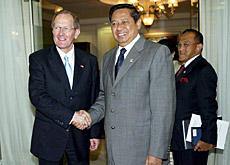NGOs take aim at free-trade accords

Developing countries risk losing out under agreements struck with Switzerland and its European Free Trade Association (Efta) partners, say campaigners.
Critics this week are highlighting the negative impact of stricter intellectual property rights and market liberalisation on people in poorer countries.
The non-governmental organisation Berne Declaration, along with civil society representatives from Thailand and Indonesia, are due to outline their concerns to Swiss parliamentarians and the economics ministry later this week.
Efta, which also includes Norway, Iceland and Liechtenstein, opened talks on a free-trade agreement with Thailand in January and has also made preliminary contact with Indonesia.
But according to the Berne Declaration, free-trade accords tend to focus on the economic advantages of cooperation while overlooking their effects on the population, public health, farmers and development.
The organisation’s Julien Reinhard told swissinfo that it was time Efta adopted a more pragmatic approach and better tailored its demands to suit the needs of each country. He also called for greater transparency during the negotiation process.
“What we have seen in the past is the same demands being repeated or even increased with each country,” he said. “This is very problematic and we would like to see this kind of process changed.”
The Berne Declaration wants the Swiss Agency for Development and Cooperation (SDC) to play a bigger role in the process.
Thai trade accord
Regarding the Efta-Thailand free-trade accord, NGOs are alarmed by moves to fix stringent new intellectual property rights standards that they say go beyond those laid down by the World Trade Organization (WTO).
Jiraporn Limpananont, associate professor of pharmaceutical sciences at Bangkok’s Chulalongkorn University, said one effect would be to extend patent protection on drugs by up to five years.
This would further delay the introduction of cheaper generic drugs and obstruct drug development in a country where around 560,000 people live with HIV and Aids, she claimed.
“If the Efta proposal goes through it will mean people cannot have access to medicine and their right to health will be undermined,” said Limpananont.
As for a free-trade accord between Efta and Indonesia, there is general agreement among NGOs that the idea should be scrapped completely.
Alexander Chandra of Indonesia’s Institute for Global Justice said previous experience with bilateral trade accords had shown that the country’s industrial and agriculture sectors could not compete with liberalisation.
“Given that Efta is composed of four rich countries it is fairly likely that we are going to be undermined in terms of bargaining power,” he said. “What we are asking for is to be given the time and space to develop our own industries so that we can have fair competition.”
Denial
The State Secretariat for Economic Affairs firmly denied that people’s needs were being ignored, saying Efta agreements struck a balance between economic and other concerns.
Christian Etter, head of the department’s Efta division, also refuted the claim that a trade accord with Thailand would delay the introduction of cheaper generic drugs. He said this was protected by an existing WTO agreement.
However, he added that one of the points of a preferential trade accord was to gain “a higher level of mutual exchange” that went beyond the minimum standards of the WTO.
“These are fair agreements that are beneficial to all the parties, otherwise they would not be struck,” Etter told swissinfo.
swissinfo, Adam Beaumont in Geneva
Efta was founded in 1960 as an alternative to the European Economic Community (now the European Union) and has 4 members: Switzerland, Norway, Iceland and Liechtenstein.
Switzerland has concluded 19 free-trade accords – the Efta convention, two bilateral accords (with the EU and the Faroe Islands) and 16 as part of Efta (Bulgaria, Romania, Macedonia, Croatia, Turkey, Israel, the Palestinian Authority, Morocco, Jordan, Tunisia, Lebanon, Mexico, Singapore, Chile, South Korea and the South African Customs Union).
Deals are being negotiated with Thailand, Egypt and Canada and preliminary contacts have been made with the Indonesia, Algeria, the Gulf States, Japan and Russia.
The combined population of Efta states is 12.4 million
Average unemployment rate is 4.2%
Efta has combined GDP of $620 billion.
It is the world’s ninth largest trading body.

In compliance with the JTI standards
More: SWI swissinfo.ch certified by the Journalism Trust Initiative











You can find an overview of ongoing debates with our journalists here . Please join us!
If you want to start a conversation about a topic raised in this article or want to report factual errors, email us at english@swissinfo.ch.